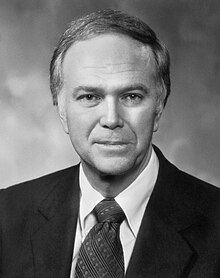Bob Packwood
Robert William Packwood | |
|---|---|
 | |
| U.S. Senator, Oregon | |
| In office 1969-1996 | |
| Preceded by | Wayne Morse |
| Succeeded by | Ron Wyden |
| Personal details | |
| Political party | Republican |
| Spouse | Georgie (divorced) |
| Profession | attorney |
Robert William "Bob" Packwood (born September 11, 1932) was an American politician from Oregon and a member of the Republican Party. He was forced to resign from the United States Senate in 1995 after allegations of sexual harassment, abuse, and assault from dozens of women emerged.
Early life and career
Lawyer turned legislator
He was born in Portland, Oregon. He graduated from Willamette University in 1954 and then graduated from the New York University School of Law in 1957. He was admitted to the bar in 1957 and practiced law in Portland, Oregon. He was a member of the Oregon Legislative Assembly from 1963 to 1968.
U.S. Senator
Packwood was elected to the Senate in 1968, defeating Wayne Morse. He was reelected in 1974, 1980, 1986 and 1992. Packwood chaired the powerful Senate Finance Committee from 1985 to 1987. He was chairman of the Senate Republican Conference, 1979-1980. His voting record was very moderate, which matched Oregon's tradition for electing mavericks to the Senate. Packwood was staunchly pro-choice and was often targeted by religious groups for his stance. He supported gun control and civil rights for minorities. In 1987 Packwood crossed party line to vote against the nomination of Robert Bork into the U.S. Supreme Court, and he was one of only two Republicans to vote against the nomination of Clarence Thomas into the court. In 1993 he was the only Senator to vote against mandatory life imprisonment for persons convicted of a third violent felony.
In 1988, Packwood had to be dragged feet-first into the Senate Chamber for a quorum call. [1]
Road to resignation
Sexual misconduct allegations
Packwood's political demise began in November 1992, when the Washington Post outlined detailed allegations of sexual misconduct by Packwood. By threatening legal action, Packwood was able to delay publication of the story until after the election, where he defeated NOW-endorsed Les AuCoin by some seventy-eight thousand votes (winning 52.1% to AuCoin's 46.5%). NOW took up the cause of at least 29 women who eventually came forward to allege sexual abuse and assaults, dating back over the years. The sexual abuse side of Packwood's problems, played up in the public media, obscured charges that he encouraged offers of financial assistance from lobbyists and other persons who had a particular interest in legislation or issues that Senator Packwood could influence. As the situation developed, he was also charged with trying to obstruct the investigation. Nevertheless, Bob Dole's PAC donated $10,000 to Packwood's defense.
In all at least twenty-nine women accused Packwood of sexual assault and abuse.
Packwood's diary
As the scandal evolved, Senator Packwood's diary became a key issue: whether a diary could be subpoenaed, whether Packwood attempted to blackmail his fellow senators with threats concerning the purported content of his diaries, and his blatant excisions from it.
Some sources stated that the purpose of the diary was to chronicle Packwoods political thoughts with the intention that they be published (in book form) after his death. [2] However, the diary also, allegedly, chronicled Packwood's sexual encounters. At one point, he reportedly muses over the blessing of having sexual access to a carefully documented number of women, (between ninety and a hundred, overall), through his work in Congress.
One paraphrase from Senator Packwood's sex diary read as follows:
After working late, several of the staff stayed to have drinks and socialize. One attractive woman lingered and hovered around me as the others left one by one. When the two of us were alone near midnight, she said she was very impressed to be able to work with such a powerful man. Then we began to touch each other. After kissing and rubbing, with no one else in the office, we dropped to the carpet for an intense session. Once done, still she stayed and talked, not wanting to leave me. Soon we dropped to the floor for a great second round.
Resignation or expulsion?
Notwithstanding public pressure for open and public hearings, the Senate ultimately decided against public hearings. With pressure mounting against him, Packwood finally announced his resignation from the Senate on September 7, 1995, after the Senate Ethics Committee unanimously recommended that he be expelled from the Senate for ethical misconduct.
After the U.S. Senate
Soon after leaving the Senate, Packwood founded a lobbying firm called Sunrise Research Corporation. Among other projects, he played a key role in the 2001 fight to repeal the estate tax.
Quotations
- "Judgment comes from experience and great judgment comes from bad experience."
- "I'm apologizing for the conduct that it was alleged that I did." — responding to accusations of sexual harassment.
- "God, was she a good player. I was so fascinated in watching her bid and play that I could hardly concentrate on her breasts." — comment from his diary on a bridge opponent, later printed in the Washington Post.
- "Am I sorry? Of course. If I did the things that they said I did. Am I sorry, do I apologize? Yes. But it is time to get on and not look back." — 1995 on a CBS news show after resigning.
- "All of us, Mr. President, whether we’re in politics or not, have weaknesses. For some, it’s drinking. For others, it’s gambling. For still others, it’s women... Your weakness is credibility..." — New York Times, 11/17/73.
External links
- Congressional Biography
- Text of the Senate's resolution for investigation, May 17, 1995.
- Packwood brought in for a quorum call
- Time Magazine article on Bob Packwood scandal
